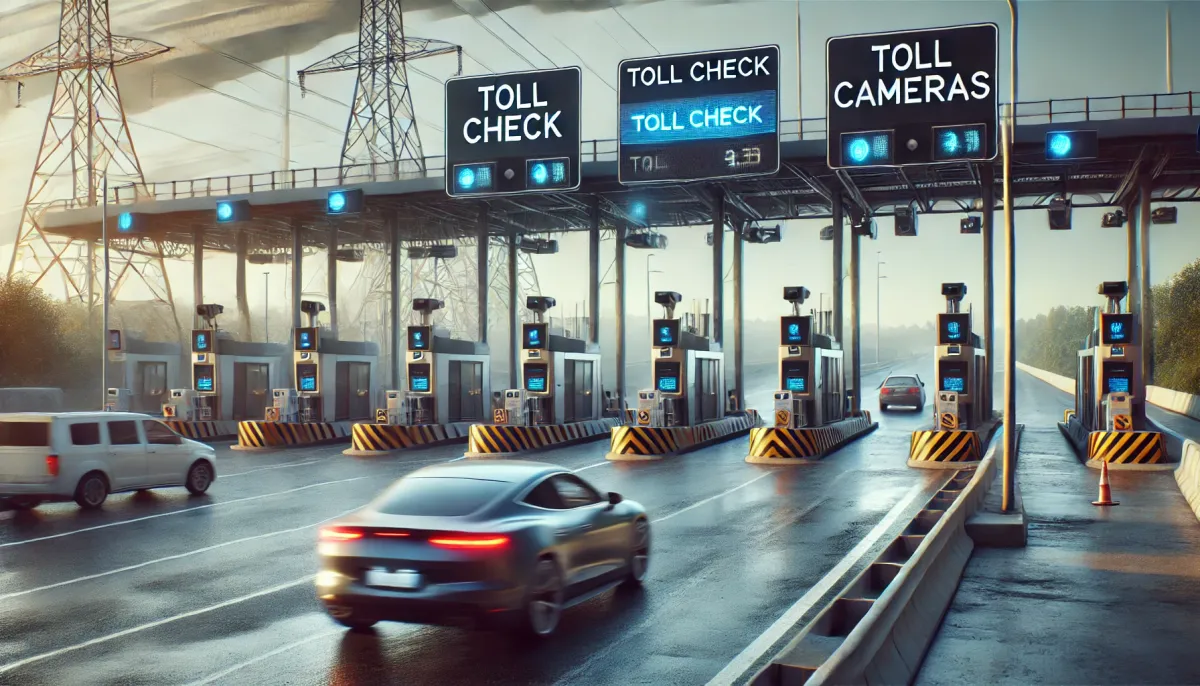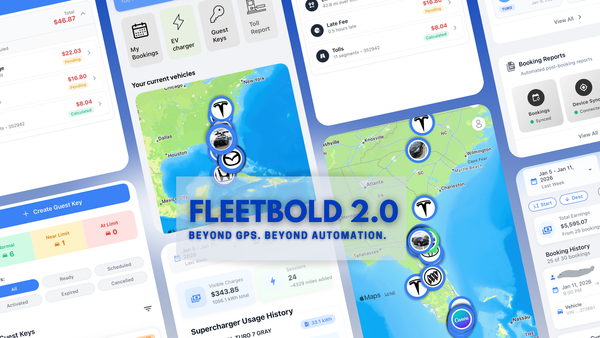How to Fix Turo Toll Issues in 2025
This blog explores the ongoing toll issues on Turo, highlighting the reasons why they occur, how to prevent large toll backlogs, and best practices for hosts and guests. Get tips on avoiding confusion and expensive mistakes in 2025.

Introduction: Why Turo Toll Issues Still Occur
Toll charges are an inevitable part of car rentals, but when managing a Turo fleet, they can become a significant issue. Many hosts face unexpected toll fees due to untracked usage, delayed billing, and miscommunication with guests. Understanding why these problems persist and how to prevent them is crucial for both hosts and guests in 2025.
This blog provides a comprehensive overview of the reasons toll issues occur, strategies for hosts to avoid them, and advice for guests on how to handle unexpected charges. By following these tips, hosts can keep their operations running smoothly, avoid financial surprises, and ensure a hassle-free experience for guests.
Untracked Usage: The Root Cause of Toll Issues
One of the primary reasons Turo hosts face toll issues is untracked usage. When a vehicle is driven through toll areas, the toll agencies typically rely on transponders or license plate recognition systems to charge drivers. However, if a host does not use a toll pass or transponder, toll charges may go unreported or be assigned incorrectly.
Why Untracked Usage Happens
Many hosts fail to use transponders or fail to set up toll passes for their vehicles. This leaves toll charges untracked, leading to confusion about who is responsible for the fees.
- Guest confusion: Without a toll pass, guests may not know how to pay for tolls, leading to missed charges.
- Inaccurate billing: Toll charges are often sent to the wrong address if plates aren’t up to date, further complicating the billing process.
How to Prevent Untracked Usage
- Install a transponder: Ensure every vehicle in your fleet has an active transponder that automatically tracks toll charges.
- Inform guests: Let your guests know how to use the toll pass or explain the toll process in your vehicle listing.
Delayed Billing Systems: The Toll Agency Issue
Another challenge hosts face is delayed billing systems from toll agencies. Toll charges are not always processed immediately after a vehicle passes through a toll booth. In many cases, tolls can take several days or weeks to be billed, causing confusion and frustration for both hosts and guests.
Why Delayed Billing Happens
- Toll agencies’ processing times: In many regions, tolls are processed in batches and can take time to show up on a host’s account.
- Late notices: Hosts may receive toll bills long after the rental period has ended, leading to a backlog of fees and confusion about which guest is responsible.
How to Address Delayed Billing
- Track tolls regularly: Monitor toll charges monthly to catch any unpaid or delayed tolls early on.
- Automated toll alerts: Set up notifications or use an automated toll payment system to avoid delayed charges.
Misaligned Payment Responsibilities: Who Pays the Toll?
Miscommunication about who is responsible for toll charges is another reason why toll issues continue to occur. Hosts typically rely on guests to pay for tolls, but lapses in communication can lead to disputes over who should cover the charges.
Why Misalignment Happens
- Unclear instructions: If the toll process isn’t clearly explained to guests, they may not realize they are responsible for the tolls they incur.
- Confusion over billing: When tolls are processed after the rental ends, guests may be confused about whether they should have paid during the trip or if they’re being charged afterward.
How to Prevent Payment Disputes
- Set clear expectations: Include clear toll policies in your vehicle listings, specifying whether guests should pay tolls directly or if they will be billed afterward.
- Document everything: Keep accurate records of the toll charges, including photos of toll receipts, and share this information with your guests to avoid confusion.
How to Prevent Massive Toll Backlogs
Managing tolls proactively is essential for preventing them from building up into massive backlogs. Here are some key strategies hosts can use to prevent toll-related issues:
Use a Valid Transponder
Encourage your guests to use a valid toll pass or transponder during their rental period. This will ensure that tolls are tracked in real time, reducing the chances of unpaid charges accumulating.
- Real-time toll tracking: With a transponder, toll charges are applied immediately, making it easier to track payments and resolve issues quickly.
Monitor License Plates
Ensure that your vehicle's plate information is up-to-date with toll agencies. Expired or mismatched plates can lead to toll charges being sent to the wrong address, creating confusion and additional fees.
- Plate verification: Check the status of your vehicle plates regularly with toll agencies to ensure no issues arise with misdirected charges.
Share Clear Guidelines
Communicate the toll process clearly in your vehicle listing. Let guests know how tolls will be handled, whether they should pay directly, or if they’ll be invoiced afterward.
- Clear guidelines: This helps manage guest expectations and reduces misunderstandings that could lead to disputes.
Check for Outstanding Balances
Regularly review tolls and unpaid balances, especially if you manage multiple vehicles. Catching any missed tolls early prevents them from accumulating into larger debts.
- Monthly reviews: Checking for outstanding tolls every month can save you from dealing with large overdue balances.
Best Practices for Guests: How to Handle Toll Payments
Guests also have a role to play in ensuring that toll charges are properly paid and not mismanaged. Here’s how guests can avoid becoming part of a toll-related dispute:
Avoid Paying the Host’s Past Fees
Only pay for tolls you accumulate during your rental period. If you see a large balance on your account, confirm it’s not due to past toll charges left unpaid by a previous guest.
Wait for Proper Invoicing
Turo hosts typically add toll charges after your trip. Always wait for the host’s invoicing before paying, and request an itemized breakdown if needed to verify the actual charges.
Communicate with the Host
If you notice any discrepancies, such as an unusually high fee or a license plate issue, reach out to the host immediately. Clear communication can resolve most toll issues quickly.
What to Do If a Dispute Arises
If a dispute occurs regarding toll charges, here’s how to resolve it efficiently:
Use Turo’s Resolution Center
Document your toll usage and submit any relevant screenshots or receipts to Turo’s Resolution Center. This helps clarify the situation and expedite the resolution process.
Maintain All Correspondence
Keep screenshots of any messages related to toll payments or disputes. These can serve as evidence in case the issue escalates.
Reach Out to Toll Authorities
If necessary, contact the relevant toll authority to verify the charges. This step ensures that you’re not paying for tolls incurred by a previous driver or due to billing errors.
Staying Ahead in 2025
As tolling systems evolve, staying informed and adaptable is crucial for both hosts and guests. Here’s how to stay ahead:
Automate Toll Payments
Integrate a toll payment system or a prepaid pass to streamline the process and make it easier for both hosts and guests to manage toll payments.
Adapt to New Technologies
As tolling becomes more camera-based and contactless, it’s important to stay updated on the latest toll policies in your area. This ensures compliance and helps you avoid surprises.
Focus on Transparency
Clear communication is key to maintaining trust with your guests. Transparent toll processes build better relationships and can help reduce disputes, ultimately leading to better reviews and a smoother experience for everyone.
Conclusion: Preventing Toll Issues on Turo
Toll issues on Turo can lead to confusion, frustration, and negative experiences for both hosts and guests. However, by using transponders, maintaining clear communication, and keeping accurate records, these issues can be avoided or resolved quickly. In 2025, staying ahead of evolving toll technologies and implementing proactive practices will ensure that your Turo hosting experience remains profitable and stress-free.
Frequently Asked Questions (FAQ)
1. How do I prevent toll issues when renting my vehicle on Turo?
Use a valid toll pass or transponder for each rental vehicle, keep plate information up-to-date with toll agencies, and clearly communicate toll policies in your vehicle listing.
2. What should I do if a toll charge is delayed?
Review your toll charges regularly and reach out to the toll authority or Turo support if there are discrepancies.
3. How can I ensure guests don’t pay for past toll fees?
Clearly communicate how toll payments are handled, and provide guests with an itemized breakdown of any fees after the trip.
4. Can I charge a guest for tolls after the rental period?
Yes, you can charge for tolls within 90 days after the rental period by submitting them through Turo’s platform.
5. How can I avoid disputes over toll payments?
Maintain clear communication with your guests, keep detailed records, and verify any discrepancies promptly to resolve issues quickly.





